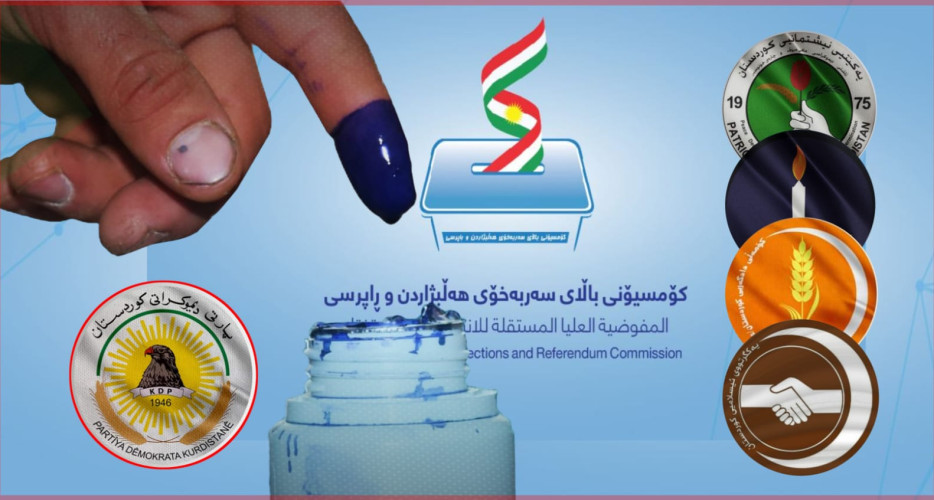
Peregraf- Erbil
Following controversy in parliament over whether its mandate has been renewed, the Kurdistan Region’s electoral commission has divided into two factions, which may prevent it from achieving quorum.
The Kurdistan Democratic Party (KDP), the Patriotic Union of Kurdistan (PUK), and the Change Movement (Gorran) each have two representatives on the commission, while theKurdistan Justice Group (KJG) and the Kurdistan Islamic Group (KIU) each have one. There is also a member representing ethnic and religious minorities, who tends to vote with the KDP.
On one side, members of the commission from the PUK, Gorran, the KJG, and the KIU say that they will not participate in meetings.
As a result, the remaining members representing the KDP and the minorities will be unable to take action with legal effect.
On May 22, a brawl erupted in the Kurdistan Parliament after the KDP tried to renew the commission’s mandate over the objections of the PUK. The KDP claims that Deputy Speaker Hemin Hawrami held a valid vote supported by 58 MPs, while the PUK says that Speaker Rewaz Fayaq adjourned the session and prevented the vote.
Ignoring the PUK’s procedural objections, Hawrami sent a letter to commission head Handren Mohammed authorizing him to begin work in order to hold elections in November. This was widely reported on media outlets affiliated with the KDP.
Sulayman Mustafa, a former deputy head of the commission, told Peregraf that another “letter was sent to the commission by the speaker, which said that the commission had not be activated.” He suggested that the commission would likely abide by this second letter from the speaker, rather than the one sent by her deputy.
Peregraf spoke with officials from Gorran, the KJG, and the KIU, who all said that they do not recognize the KDP’s contention that the commission has been reactivated.
However, they also said that they hope to use their position to put pressure on the KDP and the PUK to resolve their differences regarding elections. Their view is that the election process was not served by what occurred in parliament on May 22.
Based on those conversations, it appears that the KDP did not coordinate with any of those three parties prior to launching its bid to reactive the commission. As a result, they view the KDP’s actions as “unilateral” and contrary to the expectation that action related to the electoral law should be taken collectively.
The PUK is lobbying hard to hold Gorran, the KJG, and the KIU to that position.
A senior PUK official told Peregraf that “If the three parties refuse to participate in the reactivation of the commission, then the KDP can do nothing and elections for the Kurdistan Parliament will not be held with this expired commission.”
“We are looking to the federal commission to conduct the process," they added.
The KDP and the PUK have been at loggerheads over the election issue for nearly two years. Quadrennial elections for the Kurdistan Parliament were originally scheduled for October 1, 2022, but were delayed until this coming November after the two parties could not reach an agreement on how to conduct the polls.
The main dispute between them is over whether to reform the system of eleven seats that are reserved for ethnic and religious minorities. The PUK argues that the seats are de facto held by the KDP, which gives the party an unfair advantage.
Unable to reach an agreement through negotiations, the KDP tried to move on its own during the May 22 parliamentary session, supported by its minority allies. However, the PUK considers this to have been a violation of the Kurdistan Parliament’s by-laws.
This resulted in fundamentally opposing positions: Speaker Fayeq said the outcome of the session has no "legal and procedural value", while Deputy Speaker Hawrami argued "all the outcomes will have legal and procedural value” and that his signature carries legal weight even without the speaker’s.
Writing in its official media outlet, the PUK suggested that the Kurdistan Region’s electoral commission could be replaced with the federal commission, known as the Independent High Electoral Commission (IHEC).
That process already may be underway. Earlier this week, IHEC sent a letter to the Federal Supreme Court stating that it is ready to oversee elections in the Kurdistan Region if necessary.
The court is considering a case about whether the extension of the current term of the Kurdistan Parliament is constitutional. After missing the election last year, MPs in the Kurdistan Parliament voted to extend their term in order to give time for the KDP and the PUK to resolve their differences. Opposition party New Generation and former speaker of the Kurdistan Parliament Yousef Mohammed filed a lawsuit contesting that action.
The court held a hearing about the case on May 24, but did not hand down a ruling. The next hearing in that case will happen on May 30.
The Kurdistan Region has never held an election on time since self-governing institutions were established in 1992, but postponements were often no more than a few months. After missing elections last year, a further delay will be very embarrassing.
Western consulates and the UN have urged the parties to work together and take all measures to ensure that elections are held by the end of the year.